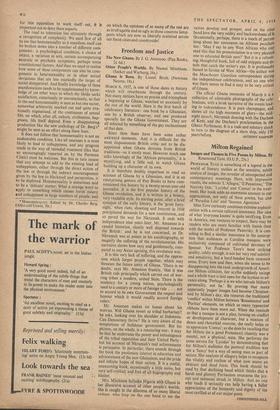Freedom and Justice
Ghana is Born. By Lionel Birch. (Newman Ncame, 18s.)
MARCH 6, 1957, is one of those dates in history which will reverberate through the century. Not many nations have so precise and triumphant a beginning as Ghana, watched so anxiously by the rest of the world. Here is the first batch of celebratory literature : one book by a Ghanaian, one by a British observer, and one produced specially for the Ghana Government. They are all infected by something of the gay enchantment of that date.
Since then there have been some rather awkward moments. And it is difficult for the most dispassionate British critic not to be dis- appointed when Ghana deviates from British traditions—as it surely must. However much one talks knowingly of the 'African personality,' it is mystifying, and a little sad, to watch Ghana building up a character of its own.
It is therefore doubly important to ,read an account of Ghana by a Ghanaian, and it is an enterprising gesture of Pan Books to have com- missioned this history by a twenty-seven-year-old journalist. It is the first popular history of the Ghana revolution, and it is written in a breezy, very readable style. Its starting point, after a brief synoPsis of the early history, is the 'great forty- eight,' when riots, shooting and boycott in 1948 precipitated demands for a new constitution, and so paved the way for Nkrumah. It ends with independence nine years later. Mr. Amamoo is a candid historian, clearly well disposed towards the British : and he is not concerned, as Dr. Nkrumah was at points in his autobiography, to magnify the suffering of the revolutionaries. His narrative shows how easy and gentlemanly, com- pared to any Asian uprising, this revolution was.
It is this very lack of suffering, and the oppres- sion which forges people together, which may threaten the future unity of Ghana. 'There is no doubt,' says Mr. Amamoo frankly, 'that it was British rule principally which carved out of war- ring tribes a modern, united State. There is the tendency for a young nation, psychologically used to a century or more of foreign rule . . . not to accord to its own Government the respect and honour which it would readily accord foreign rulers.'
Mr. Amamoo makes no bones about his worries. Will Ghana revert to tribal barbarism? he asks, looking over his shoulder at Indonesia. Can Democracy thrive? He is very aware of the temptations of bulldozer government. But his picture, on the whole, is a reassuring one: it may be that he underrates the power and intransigence of the tribal opposition and their United Party : but his account of Nkrumah's real achievements is persuasive. In particular, there sounds through the book the passionate interest in education and advancement of the new Ghanaians, and the pride and infinite hopes of their nation. It is a useful, unassuming boa, occasionally a little naive, but very self-critical; and free of all hagiography and bluster.
Mrs. Mitchison includes Nigeria with Ghana in her discursive account of Other people's worlds.. She is caught in the dilemma of so many liberal vigitors who long on the one hand to see the nation develop and prosper, and on the other hand love the very oddity and backwardness of it. Occasionally, perhaps, there is a touch of patron- ising about her comments on African peculiari- ties : 'May I say to any West African who may read this that his pronunciation is a very pleasant one to educated British ears?' But it is a refresh- ing, thoughtful book, full of odd snippets and de- tails that catch the writer's eye. It is professedly biased in favour of West Africa—the author was the Manchester Guardian correspondent during the independence celebrations, and no one who was there seems to find it easy to be very critical of Ghana.
The official Ghana memento of March 6 is a collection of admirable photographs of the cele- brations, with a brisk narrative of the events lead- ing to independence. It is pure champagne, and shows all the high moments of glory—the mid- night speech, Nkrumah dancing with the Duchess of Kent, and the Duchess's proclamation in the Ghana Parliament. It is a rude and salutary shock to turn to the diagram of a slave ship, only 150 years before. ANTHONY SAMPSON






























 Previous page
Previous page